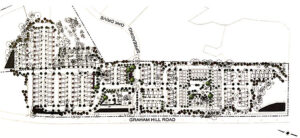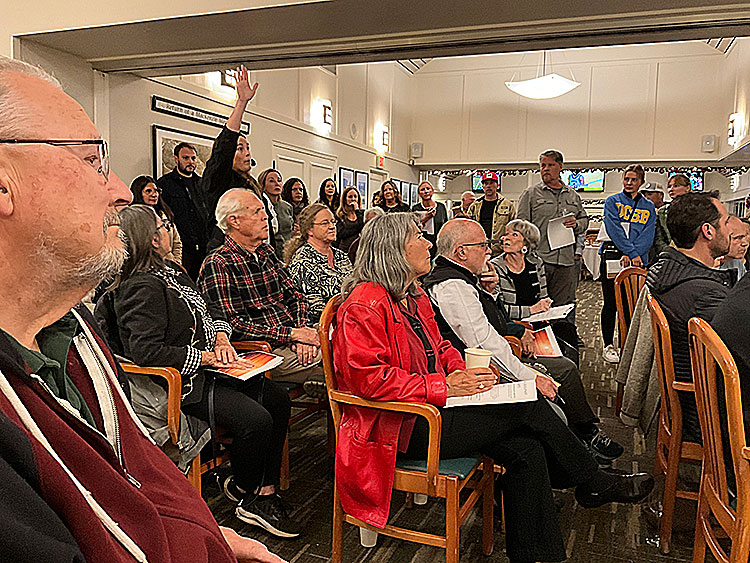By Jondi Gumz
Neighbors of the 40-acre horse pasture on Graham Hill Road, where local developer Mike Formico proposes to bult 157 homes under the California builder’s remedy, are organizing to fight the project. The development is dubbed The Haven.
On Dec 4, close to 100 people crowded into the McKenzie Bar & Grill meeting room at Pasatiempo Golf Course to attend the only meeting to be hosted by the developer, raising a multitude of issues:
- Potential gridlock on Graham Hill Road, Lockwood Lane, and Mount Hermon Road, the county’s third busiest, with 33,742 vehicles on weekdays
- Unaffordable fees to hook to up to the city of Santa Cruz sewer line at Treetop Drive,
- Long response time for a sheriff’s deputy
- Inability to get home insurance against fire on property close to Henry Cowell Redwoods State Parks,
- Removal of hundreds of trees,
- Elimination of a wildlife corridor where mountain lions roam.
Lane Tate of Southern California, embarking on his first project in Santa Cruz County, took notes.

Lance Tate represents Graham Hill Road property owner Mike Formico, who wants to build 157 homes on a 40-acre horse pasture. • Photo Credit: Jondi Gumz
Neighbors along rural Graham Hill Road did not dispute the need for housing but they questioned whether this was the right location for this size of homes, given the lack of sewer line, that not all four parcels have a water connection and that Graham Hill Road is a rural country two-lane road — no bike lanes or sidewalks — with one stoplight.
Graham Hill Road sees 24,600 vehicles on weekdays, according to a 2022 count.
The Haven would add two entrances to the development on Graham Hill Road.
The project site is outside the “urban services line,” which designates areas to stay rural from areas where denser developments are allowed.
The proposal for 157 homes is “totally out of scale,” said one neighbor.
Another, noting the original zoning for large lots in this area, said the development “will change it forever.”
Another said, “It does not make sense to us” and acknowledging the state’s housing mandate, added, “The law does not say we have to like it.”
Pointing out the need for a sewer line, one neighbor said, “You’d run the sewer line by us. Would you pay for all of us?”
To this Tate said, “I wasn’t aware of that.”
Sandhills Habitat
Alexandra Sklar, an architect, noted the blocks of homes could cut off access to water and foraging for wildlife.
Tate made a note of that.

Preliminary map of The Haven Santa Cruz, proposed for Graham Hill Road between Scotts Valley and Santa Cruz. • Courtesy of County of Santa Cruz
The area from Scotts Valley to Zayante is known as the Santa Cruz Sandhills, habitat for a unique community of plants and animals—the Ben Lomond spineflower and the protected Mount Hermon June beetle– protected as habitat was lost to sand mining and development.
The Sandhills Alliance for Natural Diversity calls for development to be clustered to maintain as large an area of habitat as possible.
One sandhills area is called Rollingwoods encompassing 184 acres along Graham Hill Road.
Other developments have funded habitat mitigation projects although some environmental experts say existing habitat should be preserved.
Tate said concerns such as traffic, habitat mitigation and noise would be addressed in the environmental review process, which would begin once the application is complete, pending a geological study and title reports.
The fire insurance crisis, with many residents in neighboring Scotts Valley being dropped by their insurer or forced to pay double or triple past premiums, was triggered by the CZU Lightning Wildfire in 2020 in Boulder Creek, one of a string of destructive wildfires in California that prompted insurance companies to pull back to avoid huge losses.
The project has the potential to impact residents in the city of Scotts Valley and in San Lorenzo Valley because of its size in the unincorporated area, zoned rural residential outside the urban services line, and on a road, Graham Hill, which is the connector for the two valleys.
Builder’s Remedy
Ordinarily a project of this size would not be entertained by county planning staff but Formico took advantage of the fact that the state had not approved the county’s “Housing Element” to submit his proposal and thus became eligible for the builder’s remedy, allowing him to bypass zoning and design review.
Santa Cruz County supervisors adopted the housing element on Nov. 14, 2023, but it was not certified by the state until April 12, 2024.
Tate Development + Investment submitted a preliminary application for The Haven on April 11.
“What discretion does the Board of Supervisors have?” asked Chris Fitz, who spent nine years as executive director of Landwatch Monterey County watching local land-use policy.
For that question, there was no answer.
Formico bought the wooded property in four parcels in 2019 from Richard Lam for $3.9 million. The property runs alongside Graham Hill Road from Lockwood Lane to the Rolling Woods subdivision and Eagle Creek runs through it.
The Haven proposes 123 single-family market-rate homes, 34 affordable townhomes, parking for 600 cars and an oversized 18,000-square foot clubhouse, which Tate said could provide space for a sheriff’s substation. Streets in the development would be private.
Tate said the project would be reviewed by the county Planning Commission and Board of Supervisors.
Construction, he estimated, could take three years.
Among those affected:
- Hidden Glen, an equestrian-friendly neighborhood of 60 custom homes on generous lots in the unincorporated county with a median price of $2 million.
- Rolling Woods, a peaceful neighborhood built in the 1970s off Graham Hill Road across from Henry Cowell Redwoods State Park.
- And the 20-acre Graham Hill Road showgrounds is a mile down Graham Hill Road.
Traffic & Water
Potential neighbors are worried about the increase in traffic on a rural road in a rural area not designed for it.
Would a stoplight be needed?
Tate said the county could require a stoplight.
“Because of CEQA, we’re at the county’s behest,” he said. “If a light is what we have to do, we will.”
He said the county has hired a consultant, Ecological Concerns of Santa Cruz, to do an environmental assessment.
“They’re not our consultants, they’re the county’s consultants.”
When a woman said, “We don’t have the water,” Tate replied, “A project doesn’t get approved if we don’t have the resources.”
To questions about access to water, he said the development would use the LAFCO process for annexing the property.
On Oct. 24, asked about the proposal, LAFCO Executive Officer Joe Serrano said:
“The proposed single parcel annexation (APN: 061-441-01) into the San Lorenzo Valley Water District. It is my understanding that the single parcel involved in the annexation application is not part of the proposed development (161 units), as indicated in the document you provided.
“The map also shows the four parcels owned by Mike Formico (APNs: 061-441-05; 061-441-06; 067-271-35; 067-271-36) that are part of the proposed development. As the map shows, the four parcels are non-contiguous to the annexation area and again not part of the annexation application into SLVWD.
“If Mr. Formico plans to develop the four parcels, he must get LAFCO approval in a separate application to receive water and sewer service. At this time, there is no application to annex the four parcels to SLVWD for water service or the City of Scotts Valley for sewer service. It is unknown whether the County, SLVWD, and the City of Scotts Valley would be willing, capable, and supportive of the proposed development and delivery of services to the four parcels. In order for an annexation to be successfully completed, all affected parties must be in agreement. It is also important to note that the four parcels are outside the County’s Urban Services Line (shown as a yellow boundary in the attached map). It is LAFCO’s understanding that the County uses the USL to determine where future developments may occur.”
Once the draft environmental impact report is released, people will have 90 days to provide feedback before the final impact report is prepared and certified by the county.
CLICK HERE to read individual letters talking about the Haven project.
•••
TOP PHOTO: Architect Alexandra Sklar raises her hand to make a point at the meeting hosted by a representative for the Graham Hill Road “builder’s rememdy” development of 157 homes. • Photo Credit: Jondi Gumz



